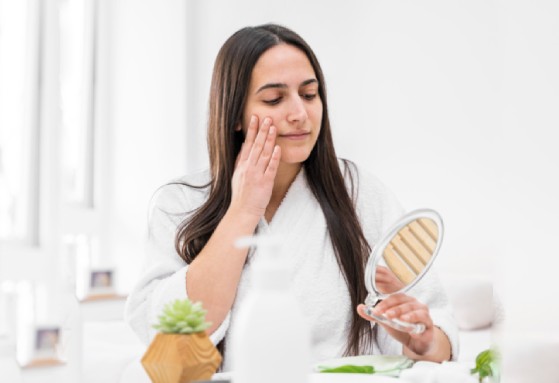
10 Myths About Acne You Should Stop Believing
Are you tired of dealing with acne and all the misinformation surrounding it? If so, you've come to the right place. Acne is a common skin condition that affects millions of people worldwide. From well-meaning advice to dubious remedies, there are countless myths about acne that can lead you down the wrong path. In this article, we will debunk ten common myths about acne and provide you with the facts you need to make informed decisions about your skincare. Say goodbye to misconceptions and hello to clearer skin!
Myth 1: Only Teens Get Acne
One of the most pervasive myths about acne is that it's a problem exclusive to teenagers. The truth is that acne can affect people of all ages, from adolescents to adults. Hormonal fluctuations, stress, and genetics can all contribute to acne breakouts. So, if you thought you'd outgrow it, think again. Acne doesn't discriminate by age.
Myth 2: Acne Is Caused by Dirty Skin
Another common misconception is that acne is a result of poor hygiene. While keeping your skin clean is essential, acne isn't caused by dirt. Acne develops when hair follicles become clogged with oil, dead skin cells, and bacteria. So, over-cleaning your face or scrubbing it vigorously won't necessarily prevent acne. In fact, it can make it worse by irritating the skin.
Myth 3: Popping Pimples Makes Them Disappear
We've all been tempted to pop a pimple at some point, but it's time to dispel the notion that this is a good idea. Popping pimples can lead to scarring, infection, and more breakouts. It's best to let pimples heal naturally or seek professional help from a dermatologist for safe extraction.
Myth 4: Sun Exposure Clears Acne
Some people believe that tanning or sun exposure can help clear up acne. While sun can temporarily dry out the skin and mask the appearance of acne, it's not a long-term solution. In reality, excessive sun exposure can damage your skin and lead to more problems down the road. Always use sunscreen to protect your skin.
Myth 5: Toothpaste Is a Quick Fix for Acne
You may have heard the old trick of applying toothpaste to a pimple to dry it out. Unfortunately, this is not a recommended solution. Toothpaste can be too harsh for the skin, causing irritation and potentially making the pimple more noticeable. Instead, opt for acne-specific treatments with the guidance of a dermatologist.
Myth 6: Acne Is Contagious
Acne is not a contagious condition. You can't "catch" acne from someone else by sharing towels, pillows, or any other personal items. It's not a disease but a skin condition influenced by factors like hormones, genetics, and lifestyle.
Myth 7: Makeup Causes Acne
Wearing makeup doesn't necessarily cause acne, but using the wrong products or failing to remove makeup thoroughly can clog your pores and contribute to breakouts. Look for non-comedogenic or oil-free makeup and always remove your makeup before bedtime.
Myth 8: Acne Is Only a Cosmetic Problem
Acne goes beyond being just a cosmetic issue. It can have a significant impact on one's self-esteem and mental health. People with severe acne may experience emotional distress and a decreased quality of life. Seeking treatment for acne is not just about appearance; it's about overall well-being.
Myth 9: Acne Will Disappear on Its Own
Another myth is the belief that acne will magically disappear as you get older. While some people do outgrow acne, many do not. Leaving acne untreated can lead to scarring and persistent skin issues. Early intervention and proper skincare are essential.
Myth 10: All Acne Treatments Work for Everyone
There is no one-size-fits-all solution when it comes to acne treatments. What works for one person may not work for another. It's crucial to consult with a dermatologist to determine the most effective treatment plan for your unique skin type and condition.
Conclusion
In conclusion, there are numerous myths surrounding acne that can misguide you in your quest for clear, healthy skin. By dispelling these misconceptions and seeking professional advice, you can better manage your acne and prevent further breakouts. Remember that acne is a common skin condition, and you're not alone in your journey to conquer it.
Now, let's address some frequently asked questions about acne to provide you with additional insights.
FAQs
Can stress cause acne?
Yes, stress can contribute to acne breakouts by increasing hormone production, leading to oilier skin.
Is it safe to use over-the-counter acne products without consulting a dermatologist?
It's generally safe for mild acne, but if your condition is severe or not improving, consult a dermatologist for personalized advice.
Are there any natural remedies that effectively treat acne?
Some natural remedies, like tea tree oil and aloe vera, may help, but their efficacy varies from person to person.
How long does it take for acne treatments to show results?
Results vary, but it can take several weeks or even months to see significant improvement with acne treatments.
What lifestyle changes can help prevent acne?
Maintaining a healthy diet, staying hydrated, managing stress, and using suitable skincare products can contribute to acne prevention.
Don't let acne myths hold you back from achieving the clear skin you desire. Armed with the right knowledge, you can make informed decisions and take effective steps toward managing and treating your acne. Remember, seeking guidance from a dermatologist is the best way to address your unique skincare needs.